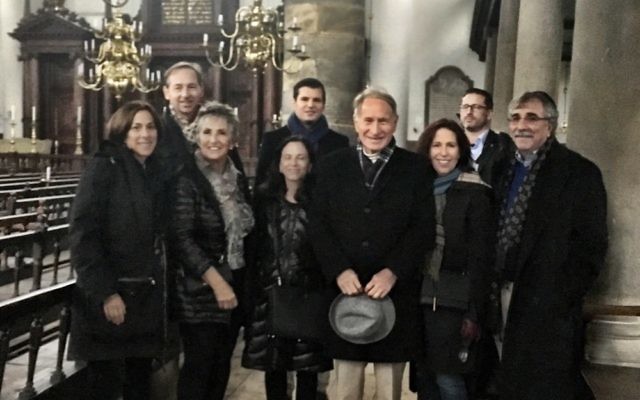Jews in Europe Have Effective Friend
By Merle Horwitz and Murray Goldman
Jews in Europe face an increasingly hostile environment, and many of them wonder whether they should stay or immigrate to Israel, the United States or other countries.
They feel threatened by right-wing hate groups and by the “progressive” left. Synagogues, religious schools and other Jewish locations are under constant protection by police and Jewish volunteer guards.

American Jewish Committee established the Transatlantic Institute in 2004. With headquarters in Brussels, Belgium — the capital of the European Union — it advocates for the Jews of Europe. Under the leadership of Daniel Schwammenthal, TAI has become an effective voice throughout the continent, combating hate speech and lobbying the EU and European leaders to pass legislation against anti-Israel and anti-Semitic rhetoric.
AJC also has strategically placed offices in Paris, Berlin, Rome and Warsaw.
We are privileged to be members of the TAI board. We recently attended its semiannual board meeting, spending five days in Amsterdam, The Hague and Brussels with the TAI staff, AJC leadership and board members from around the United States.
We were fortunate that David Harris, the CEO of AJC, and Jason Isaacson, the director of AJC’s Office of Government and International Affairs, could accompany us for most of the meetings. The entire experience gave us the opportunity to see top professional international Jewish statesmen interacting with European diplomats and advocating the Jewish people and Israel on extremely complex and difficult issues.
In Amsterdam we met with local Jewish leaders, writers and students, as well as Dutch politicians and commentators.
Leon de Winter, a noted Jewish writer and commentator, started us off by projecting a very dim outlook for Jews in the Netherlands, saying that hostility toward Israel has increased anti-Semitism and noting the danger posed by the nonassimilation of Muslim immigrants, whose values are completely different from those of the Dutch. Political correctness, he added, has exacerbated the problem.
In addition, Dutch politicians do not want to hear strong Jewish voices. Fortunately, conservative Christians are friendly to the Jews.
Others we met with echoed those sentiments. Esther Voet, the editor in chief of the New Israelite Weekly, told us that if she had children, she would leave Europe. The only ray of hope came from the young Jewish students, who felt that the situation could improve.
Next, we went to The Hague for meetings with the head of Europol’s counterterrorism department, Israel’s ambassador to The Netherlands, the senior analyst of the Office of the Prosecutor for the International Criminal Court, and the Middle East director of the Dutch Ministry of Foreign Affairs.
They gave us insight into the tensions surrounding the Israeli-Palestinian issue. The bottom line is that Israel is respected for its democracy, its skill in fighting terrorism and its economic accomplishments, but the occupation of the West Bank and the settlements make it impossible for these institutions to publicly embrace Israel.
After Harris succinctly laid out AJC’s talking points, a number of these people conceded that Palestinian behavior was a major factor in the failure to reach peace. The Dutch and the EU have initiated several projects for Israelis and Palestinians to work together to solve water, energy and border-crossing issues.
Finally, we spent several days in Brussels, meeting with EU leaders to discuss the future of relations among the EU, the United States and Israel in the aftermath of Brexit, the Trump victory, and the rising right-wing political tide in Western Europe.
AJC and TAI focused on addressing the plight of European Jews, specifically the anti-Semitic rhetoric appearing on social media from right-wing politicians and some (not all) of the Muslim community.
One politician said: “The right hates Muslims and Jews. The left attacks Jews but savors and makes excuses for the Muslims.”
The issues are complex. For example, Jewish values would lend support for immigration and refugees, even as the Muslim immigrants add to the anti-Semitic environment. European Jews need a strong U.S.-EU relationship, and EU officials asked the AJC leaders to help strengthen it, but no one could say if the bond would survive in this brave new world.
There were also discussions on the economic ramifications of Brexit and the new Trump administration.
After a whirlwind five days, we were left with these impressions:
- Jews in Europe are in a dangerous situation, and they wonder whether the situation will come to resemble the 1930s and 1940s, when the optimists stayed and died and the pessimists left and survived.
- The director of the Anne Frank House explained that Holocaust education is effective only on younger people who have not yet been indoctrinated to hate Jews. It has no effect on anti-Semites.
- European politicians need to publicly support Jews and confront anti-Semitic tendencies.
- Without the support of American Jews and the U.S. government, European Jews and Israel would face imminent danger.
- The Israeli-Palestinian conflict is not a major priority for European nations.
- AJC and TAI are very influential in advocating the welfare of Europe’s Jews and strengthening Israeli-European relations.
- AJC and TAI are largely responsible for advocating acceptance of the working definition of anti-Semitism by the EU and the Organization for Security and Cooperation in Europe. They explain to Europeans that Israeli-Palestinian peace will not succeed unless we focus on the day after peace, to ensure that Hamas and other terrorists do not take over the new Palestinian state
- The time has come for American Jews to fully recognize the situation and assist our brethren abroad.
We learned from this trip that American Jews are fortunate to live in a country that does not foster an anti-Semitic environment. But we cannot forget that the rest of the Jews around the world need our help. Similarly, to survive, the Jewish Diaspora needs Israel, and Israel needs the diaspora.




comments